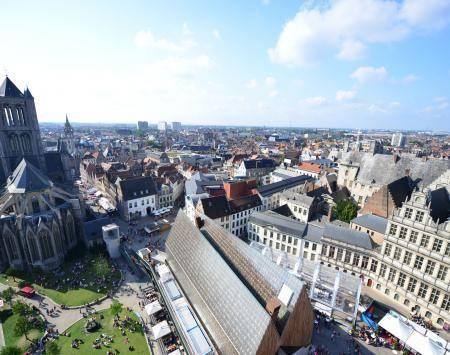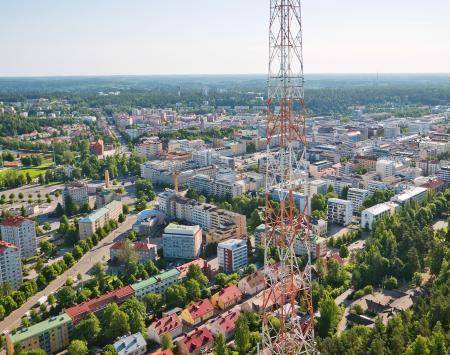Toulouse Metropole
Urban mobilityCOMMUTE - Collaborative Mobility Management for Urban Trafic and Emissions reduction (Closed)
"Due to its attractiveness and active population, our metropolis benefits from a great pool of research and innovation. This is why, within the scope of the COMMUTE project, we are particularly pleased to experiment the solutions that will make it possible to perpetuate, in Toulouse as anywhere else, the movements of each person and the quality of life for all. Collaborative management, digital applications, scalable infrastructures... it's up to all of us to invent tomorrow's mobility!"
Composed of 115 municipalities and more than one million inhabitants, the metropolitan area of Toulouse is a territory with a strong demographic and economic growth. By 2030, the area is expected to host 250 000 people, 140 000 jobs and 200 000 to 230 000 additional homes in the large urban centre of Toulouse (compared to the situation in 2008).
If the entire territory is characterised by this attractiveness, regarding the demographic growth, the suburban areas are the ones to see their population increase the most, especially in the western and northern areas of the conurbation. One thing is sure, this growth will affect mobility. In the large urban centre, the amount of daily journeys, all modes combined, will be of 4,5 million by 2025 that is to say 500 000 more than today. Regarding employment, its distribution is very polarised. The big peripheral employment nodes have developed along the main roads.
The metropolitan area has four mobility poles (north-east, south-west and north-west) structured around several centres to where inhabitants travel to daily.
The chosen territory for the deployment of the COMMUTE project is integrated into a wider perimeter, the north-western mobility area. This area is highly attractive due to the presence of the aeronautical and airport area, major economic territory of the Toulouse conurbation comprising more than 71 000 jobs and possesses an international flagship facility: Toulouse-Blagnac airport (sixth busiest French airport).
The aeronautical and airport economic activity area, like the other job hubs, now suffers from poor accessibility due to the congestion of the transport networks. This results in delays (24 hours lost/car driver/year in traffic jams in Toulouse's conurbation in 2016), losses in activity, stress and an increase in noise and pollution due to the massive use of private cars. Given the high modal share regarding private cars in the north-western zone (73 % following a 2013 household mobility survey), the main stake of the project is to provide alternative sustainable mobility solutions to the employees of the aeronautical and airport area regarding commuting journeys in the context of a sustained demographic and economic growth.
Besides, like in most of other strongly urbanized conurbations, it isn't possible to build new infrastructure in the short term. In order to address this recurring mobility problem and the following issues:
- Economic attractiveness in the aeronautical area
- Demographic attractiveness in the conurbation
- Energy performance and air quality
- Quality of life of the inhabitants and workers in the area
It is necessary to take an innovative approach grouping the main stakeholders in the area of the COMMUTE project in order to significantly change their mobility habits.
To face the challenges identified, Toulouse Métropole, as urban authority, wants to engage in a new innovative approach involving the main stakeholders in the area in order to significantly change their travel patterns.
The project consists in developing coordinated combined actions in a predefined perimeter by working together in partnership:
• a new urban mobility collaborative management system that will aim at providing suggestions and recommendations but also set up an innovative way to co-create and cooperate between the members of the management system (that will bring together the delivery partners and the stakeholders) but also ensure a shared implementation.
• A digital platform dedicated to urban mobility measuring the impacts of the implemented experimentations and that would also be a decision-making tool for the mobility players on the basis of real-time data.
• Innovative actions contributing to the reduction of traffic through the deployment of new ways of working (telecommuting, modular timetable, etc...), mobility services (car sharing, ride sharing for small distances, etc), new infrastructure (autonomous shuttles) ;
• Their coordinated and contractualised implementation by each stakeholder during the experimentations that will have to demonstrate that it is possible to reduce bottlenecks without significantly changing the infrastructure.
In order to accompany the setting up of these solutions, the project will aim to assist companies in targeting and encouraging their employees who complete single driver journeys and who wish to opt for alternatives to car use through a system of rewards, to be defined with the organisation of awareness-rising events on urban mobility.
- Toulouse Metropolitan Authority
- SMTC Tisséo - Local Transport Authority
- AIRBUS SAS - Private Company
- SOPRA STERIA - Private Company
- French Standardization Association – AFNOR - Private company
- Companies Club ‘Réussir’ CER - Private company
- Regional Aircrafts ATR - Private company
- SAFRAN - Private company
- Toulouse Blagnac Airport - ATB - Airport
The main results expected from the project will be noticeable firstly at a local level. They will deal with:
- the traffic flow stabilisation during rush hours on the experimentation network of the area
- improvement of the accessibility of the airport area (thanks to modular timetable, telecommuting, intermediary places and autonomous shuttles)
- new mobility management modes for employees: a new innovative approach that mobilises the main stakeholders in the airport area to profoundly change the way in which they interact as mobility actors and thus meet the challenges of congestion in the territory
- employees' modal shift towards softer modes: allowing them to choose the best mode to use (other than using private cars), awareness raising for other ways of working (co-working spaces, telecommuting), modular timetable...
- new management modes within the companies enabling a time flexibility for the employees
Besides, the project hopes to create a new type of governance that will develop know how on how to bring together different types of stakeholders involved but also redefine decision-making modes and participate in making them open to changes as well as changing citizens' behaviours by proposing competitive services responding to their needs.
The ultimate outcome expected is to test this innovative solution in order to improve the congestion levels in the city as well as the possibility to propose a complete and adaptable solution that can be replicable at another scale, in another territory and in different contexts but that shares the same challenges to face up to the growing urbanisation phenomenon and road traffic congestion.
April 2018: Public kick-off event organised at Toulouse Métropole and presentation of a Memorandum of understanding to be signed by stakeholders, as key actors on mobility issues.
June 2018: Beginning of the construction works for the carpooling parking (administrative procedures have been secured).
October 2018: First version of the Digital platform released.
July 2019: Based on the inter-mobility plan validated and the territorital analyses, new working modes as part experimentations have been tested. Construction works phase is terminated : the recharge station for electric vehicles is implemented, the itinary road for the autonomous shuttle is designed and the 3 phases for its deployment are completed.
November 2019: 2nd version of the Digital platform released (including decision-making functionalities and third users' interfaces). The design of the management and gouvernance system is improving including economic and legal dimensions. A mid-term evaluation of the project is carried out.
June 2020: The economic model of the Collaborative management system is defined based on feedbacks from experimentations. This will ensure the replicability of the project.
September 2020: Normative standards of the project are defined to enable reproducibility of the management system to be ensured. The final version of the Digital platform is released, new working modes and new mobility services are implemented. Final public kick-off event presenting all the project results.
















